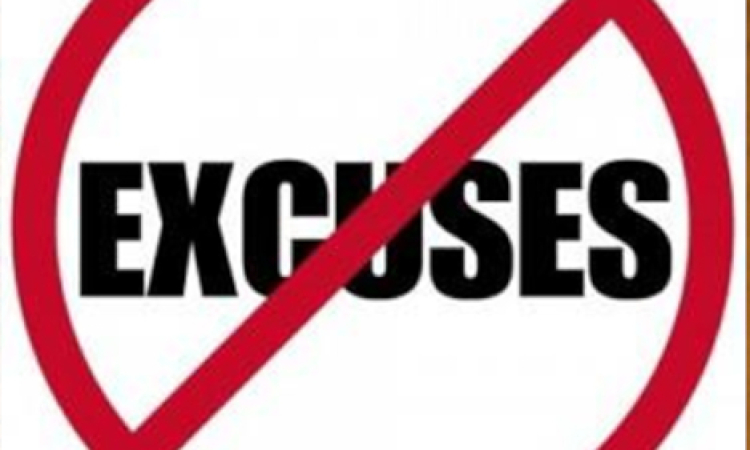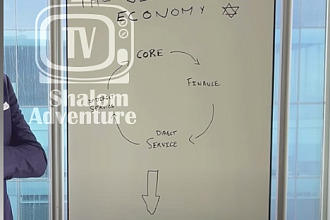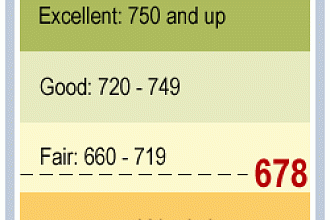We sometimes make excuses for our shortcomings and human frailties and this failing can be more prominent in money management than in other areas of our lifestyle. Two of the most widespread excuses are: I just don't have the time and I just can't afford it. Both seem to add validity to our string of lame excuses. Listed below are common examples of excuses:
Excuse: I just pay the minimum on my credit card because I can't pay it in full.
Credit card companies just love you when you make this excuse. In fact, this is exactly what they are hoping for as this is the golden goose that they make money on. Making minimum payments barely covers the interest so it puts you father behind each month and makes you pay forever with interest!
According to CNN, the average American household with at least one credit card has approximately $16,000 in debt. If that is true, then the average household is spending $2,000 a year just on interest! Paying an extra $100 per month would save you $132 in interest annually1 but what would be much better is to live on plain beans and rice until the credit card is paid in full. Saving that $2000 a year for a wonderful vacation or placing it in a mutual fund for a sunny retirement is a far better idea. In plain cold cash without interest, that would be a savings of $80,000 over a forty-year period. With compound interest, it could become twice that amount—over $160,000.
Look at it a different way: Making payments towards reducing your credit card debt is in effect earning you interest rather than the credit card company. Whether it's 6%, 15%, 25%, or any other percentage in between, it's more than you'll currently earn anywhere else.
Excuse: I dislike household budgets and rarely stick to one.
This excuse is probably the most overused when it comes to money management because some individuals and families feel that a budget restricts their lifestyle and they are hampered by the discipline of staying within a budget boundary. The truth—a household budget is nothing more than a PLAN for your income. It is designed to maximize your income and minimize your expenses. In other words, it's just telling your money where to go. Think of your budget as your own private business where you manage income and expenses. Your 'employees' are the dollars you bring home in your paycheck. Your 'Spending Plan' or household budget is where you give these dollar employees a specific job to do. Plus, you must supervise them monthly to make sure they are following your instructions.
With that being the situation, how many dollar employees are you going to assign to your FIRM items such as mortgage, rent, or vehicle payments? (FIRM items are those that don't change month-to-month or even year-to-year.) How many dollar employees are you going to assign to FLEXIBLE items such as utilities, telephone, cable, garbage pick-up, etc.? (FLEXIBLE items are those that can vary in amount but are necessary for your existence.) How many dollar employees do you need for FIXED items such as food, clothing, contingencies, hobbies and crafts, etc.? (FIXED items are those items that you need to fix at a set amount or you will overspend and fall into debt.)
You will have numerous dollar employees to cover all your wants and needs and your most important job is to make sure they do exactly what you have appointed them to do. They will occasionally foul up and you will have to make adjustments and modifications, and other times you will have to be innovative with these dollar employees if your household budget is going to work.2
We sometimes make excuses for our shortcomings and human frailties and this failing can be more prominent in money management than in other areas of our lifestyle. Two of the most widespread excuses are: I just don’t have the time and I just can’t afford it. Both seem to add validity to our string of lame excuses. Listed below are common examples of excuses:
Excuse: I just pay the minimum on my credit card because I can’t pay it in full.
Credit card companies just love you when you make this excuse. In fact, this is exactly what they are hoping for as this is the golden goose that they make money on. Making minimum payments barely covers the interest so it puts you father behind each month and makes you pay forever with interest!
According to CNN, the average American household with at least one credit card has approximately $16,000 in debt. If that is true, then the average household is spending $2,000 a year just on interest! Paying an extra $100 per month would save you $132 in interest annually1 but what would be much better is to live on plain beans and rice until the credit card is paid in full. Saving that $2000 a year for a wonderful vacation or placing it in a mutual fund for a sunny retirement is a far better idea. In plain cold cash without interest, that would be a savings of $80,000 over a forty-year period. With compound interest, it could become twice that amount—over $160,000.
Look at it a different way: Making payments towards reducing your credit card debt is in effect earning you interest rather than the credit card company. Whether it’s 6%, 15%, 25%, or any other percentage in between, it’s more than you’ll currently earn anywhere else.
Excuse: I dislike household budgets and rarely stick to one.
This excuse is probably the most overused when it comes to money management because some individuals and families feel that a budget restricts their lifestyle and they are hampered by the discipline of staying within a budget boundary. The truth—a household budget is nothing more than a PLAN for your income. It is designed to maximize your income and minimize your expenses. In other words, it’s just telling your money where to go. Think of your budget as your own private business where you manage income and expenses. Your ‘employees’ are the dollars you bring home in your paycheck. Your ‘Spending Plan’ or household budget is where you give these dollar employees a specific job to do. Plus, you must supervise them monthly to make sure they are following your instructions.
With that being the situation, how many dollar employees are you going to assign to your FIRM items such as mortgage, rent, or vehicle payments? (FIRM items are those that don’t change month-to-month or even year-to-year.) How many dollar employees are you going to assign to FLEXIBLE items such as utilities, telephone, cable, garbage pick-up, etc.? (FLEXIBLE items are those that can vary in amount but are necessary for your existence.) How many dollar employees do you need for FIXED items such as food, clothing, contingencies, hobbies and crafts, etc.? (FIXED items are those items that you need to fix at a set amount or you will overspend and fall into debt.)
You will have numerous dollar employees to cover all your wants and needs and your most important job is to make sure they do exactly what you have appointed them to do. They will occasionally foul up and you will have to make adjustments and modifications, and other times you will have to be innovative with these dollar employees if your household budget is going to work.2
Excuse: Saving—I just don’t earn enough!
Saving money is really not an option. Any day soon, Murphy’s Law will come into play in your finances and you will be faced with a medical, vehicle, or a maintenance emergency. The best method is to save 10 percent of your salary and live on the other 90 percent as if it were 100 percent. Have your employer take out the 10 percent before you receive your biweekly salary as a direct deposit and after a few weeks you will not even miss it. Paying yourself might seem impossible until you try it. Remember, the first thing you need to save for is $1,000 in an emergency account and once you have that money tucked away, Murphy’s Law reverses itself and life goes on without those unplanned crises. If your paycheck really, truly, ONLY covers your basic necessities, you need to either work a few more hours or get a job that pays more.
Excuse: Why, it’s only a few dollars!
The cost of a cup of frozen yogurt or coffee, a newspaper, a magazine, or a snack will quickly add up if you purchase these or similar items on a daily basis. These small items here and there may seem inconsequential but dollar dribbling can add up to a minimum of $1,000 annually and these money leaks can often undermine a household budget in no time. Remember the old saying, “Waste Not, Want Not.”
It is easy to find excuses to let us off the hook, but with a little less rationalization and more resourcefulness and determination we could reduce our financial miseries and increase our economic peace of mind. Maybe what we need is an ‘excuse-lobotomy’. Ultimately, it's the dollars and cents that you don’t spend that give you freedom from excuses and let you live the life you desire.
References:
1Concepts from No More Money Excuses, Debt-Proof Living, November 2013, p. 10.
2Ibid.
Saving money is really not an option. Any day soon, Murphy's Law will come into play in your finances and you will be faced with a medical, vehicle, or a maintenance emergency. The best method is to save 10 percent of your salary and live on the other 90 percent as if it were 100 percent. Have your employer take out the 10 percent before you receive your biweekly salary as a direct deposit and after a few weeks you will not even miss it. Paying yourself might seem impossible until you try it. Remember, the first thing you need to save for is $1,000 in an emergency account and once you have that money tucked away, Murphy's Law reverses itself and life goes on without those unplanned crises. If your paycheck really, truly, ONLY covers your basic necessities, you need to either work a few more hours or get a job that pays more.
Excuse: Why, it's only a few dollars!
The cost of a cup of frozen yogurt or coffee, a newspaper, a magazine, or a snack will quickly add up if you purchase these or similar items on a daily basis. These small items here and there may seem inconsequential but dollar dribbling can add up to a minimum of $1,000 annually and these money leaks can often undermine a household budget in no time. Remember the old saying, "Waste Not, Want Not."
It is easy to find excuses to let us off the hook, but with a little less rationalization and more resourcefulness and determination we could reduce our financial miseries and increase our economic peace of mind. Maybe what we need is an 'excuse-lobotomy'. Ultimately, it's the dollars and cents that you don't spend that give you freedom from excuses and let you live the life you desire.
References:
1Concepts from No More Money Excuses, Debt-Proof Living, November 2013, p. 10.
2Ibid.


























